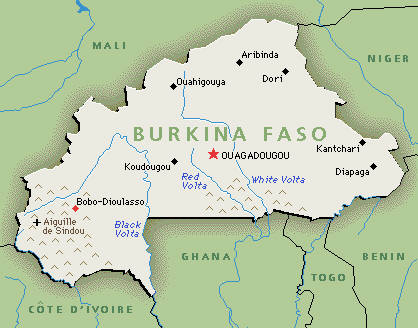Burkina Faso, Compaore and the Pentagon


Carrie Levine Correspondent
In June, Burkina Faso’s minister of human rights and civil promotion, in the midst of civil unrest in her West African nation, travelled to Washington, DC., to meet with members of Congress and other US officials. Helping arrange the meetings: CD Global Strategies, a DC-based public relations firm led by Calvin Dark, who touts his experience working on behalf of foreign political officials.
The outreach on behalf of Burkina Faso fell squarely under the Foreign Agents Registration Act, an anti-propaganda law meant to make sure the public is informed about any foreign attempts to influence US public opinion and policy.
The law explicitly requires those acting on behalf of foreign principals to register and disclose their activities to the US Department of Justice within 10 days of agreeing to become a foreign agent and before doing any work.
But CD Global Strategies didn’t register until November 11, months after its public relations work for Burkina Faso Minister Julie Prudence Nigna/Somda began, a review of FARA filings by the Centre for Public Integrity found.
The disclosures came months after the firm had arranged meetings on Burkina Faso’s behalf with Rep Karen Bass (D-Calif.), ranking member of the House Foreign Affairs Committee’s Sub-committee on Africa, Global Health, Global Human Rights and International Organisations; Sen. Bob Corker (R-Tenn.), ranking member of the Senate Foreign Relations Committee; Rep. Hal Rogers, chairman of the House Appropriations Committee; and Sen. Jeff Flake (R-Ariz.), a member of Senate Foreign Relations.
Burkina Faso officials also met with representatives from USAID and the Millennium Challenge Corporation to discuss the nation’s human rights efforts. Both entities fund programmes in Burkina Faso.
Ouagadougou, the capital of Burkina Faso, is home to a strategically important base for Pentagon surveillance missions.
In recent years, the US has escalated its military and intelligence presence in West Africa, even among states previously considered to be within the strategic interests of Paris.
Compaore was a participant in US Africa Command (Africom) counter-terrorism operations in West Africa. These programmes include a presence for Pentagon personnel within the country and the training of military officers in the US so that they can more effectively carry out Washington’s aims on the continent.
Of the new appointee, Zida, the Washington Post wrote on November 3: “‘In 2012, when he was a major, Zida attended a 12-day counter-terrorism training course at MacDill Air Force Base in Florida that was sponsored by the Defence Department’s Joint Special Operations University,’ said Army Lt- Col. Mark R. Cheadle, a spokesman for the US Africa Command. ‘That same year, Zida attended a five-day military intelligence course in Botswana that was financed by the US government,’ Cheadle said.”
The article continues: “The US military has developed a close relationship in recent years with Burkina Faso, which has allowed the Pentagon to operate a secretive Special Operations base that it uses to conduct reconnaissance flights across West Africa.”
Interestingly, Washington, which officially says that it cannot conduct normal relations with states where the military has seized power, has not labelled the current situation in Burkina Faso a coup.
Capt. Amadou Sanogo, who led a military coup in Mali in March 2012, was also trained at Pentagon bases in the US. Additionally, the military seizure of power in Egypt on July 3, 2013, was carried out by Gen. Abdel-Fattah El-Sisi, a former student in Pentagon training programmes.
The Egyptian military has long ties with the Pentagon and the Central Intelligence Agency. As with Burkina Faso’s current political situation, Washington did not describe as a coup Egyptian President El-Sisi’s seizure of power. Additionally, for over three decades, Washington has provided more than US$1 billion a year to the Egyptian military.
Referring to the Pentagon counterterrorism programme in West Africa, the Washington Post noted: “A key hub of the US spying network can be found in Ouagadougou, the flat, sun-baked capital of Burkina Faso, one of the most impoverished countries in Africa. Under a classified surveillance programme code-named ‘Creek Sand’ dozens of US personnel and contractors have come to Ouagadougou in recent years to establish a small airbase on the military side of the international airport.” (June 13, 2012)
Burkina Faso is an emerging mineral producer, attracting foreign investment from firms in the leading capitalist states. The country is the fourth-largest producer of gold on the continent. Mining activities in other areas are underway.
The consultancy firm CD Global Strategies also on November 11 first disclosed work for the West African nation of Togo under an agreement dated September 19, nearly two months earlier.
CD Global Strategies reported earning US$30 000 for the Burkina Faso work and US$100 000 for assisting Togo.
Asked about the belated filings, Dark said: “Everything is fine from our end with the Justice Department. We went through our counsel and filed it and provided all the necessary documents and information.”
Dark said the firm’s work with Burkina Faso has ended, but the relationship with Togo is ongoing.
The embassy of Burkina Faso did not respond to a request for comment regarding the filings.
Additional info by Abayomi Azikiwe. – Daily Beast.









Comments